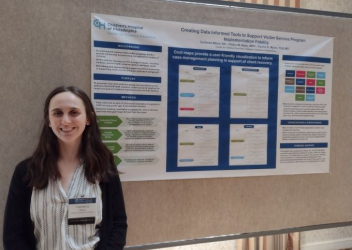Research In Action
Research In Action
Breadcrumb

In Philadelphia, shootings involving young people (both fatal and non-fatal) more than doubled during the COVID-19 pandemic, and the racial disparity in such injuries widened. In this context, there is an urgent need to improve our understanding of the various individual-, family-, and neighborhood-level factors influencing injury risk and recovery and inform systemic intervention strategies to address pediatric violence and promote health equity.
Research regarding risk and protective factors for community violence is abundant but frequently focuses on individual characteristics or broad community-level characteristics, such as socioeconomic disadvantage and racial composition. These data, which often focus on the deficits within communities, also lack sufficient nuance to inform localized public health intervention efforts. With research consistently identifying social determinants of health as a driving force of violence, identifying neighborhood-level protective factors holds promise to inform innovative prevention strategies to meaningfully improve child and family well-being.
An Opportunity to Build Evidence
To launch this work, we are excited to recently have been selected as an inaugural awardee for the Accelerate Health Equity grants program, which supports innovative projects focused on the efficacy, outcomes, and scalability of health-system interventions to prevent gun violence. Our study proposes to build on our team’s depth of data and expertise regarding the experiences of individual patients and families who have received care at CHOP following experiences of community violence and work to identify neighborhood-level data related to injury risk and recovery.
With these data, our vision is that we will be better able to understand the resources and features of the communities in which young people live and use this knowledge to both inform how we deliver care to patients and their families and how we may be able to enhance communities to reduce the risk of future violence. We know that where our patients and families live influences their risk of injury and the ease with which they are able to access the services integral to their health and well-being. With this new grant award, we are excited about the opportunity to build evidence that helps us understand and improve the outcomes our patients and families experience.
Going Beyond Traditional Data Sources
We are also excited that this support will strengthen our partnership with other CHOP investigators. We are working closely with Vicky Tam, MA, a geospatial data scientist with CHOP’s Data Science and Biostatistics Unit (DSBU), who has tremendous experience working at the intersection of geospatial data and public health. One of the unique aims of our new project is to expand the community-level data we consider when examining health outcomes and health equity. By leveraging the programmatic data of CHOP’s Violence Intervention Program and the expertise of the DSBU, we seek to identify and bring together data that go beyond more traditionally considered data sources, such as those available from the US Census Bureau.
With this grant’s support, we are working to identify data regarding geographically specific and modifiable factors potentially associated with pediatric violence and recovery. In doing so, we believe that this work will help to identify entry points for public health interventions to address longstanding inequities and improve well-being for young people.
While we often speak of how our CHOP Violence Intervention Program (VIP) and similar hospital-based violence intervention programs use a social-ecologic framework, much of what we assess and address within these programs focuses on individuals and families served and not always inclusive of broader community influences. This grant award is moving us a step closer to bridging that gap in our knowledge so that we can more comprehensively describe the environment in which our program provides services and the barriers and facilitators to recovery.
We are excited for how this work will support our ability to identify novel ways to address the root causes of health inequities in our community. This research is formative to continuing our efforts to engage in data-informed advocacy, intervention development, and evaluation of what works and for whom with regards to reducing the burden of pediatric violent injury and supporting recovery of impacted young people and families.



